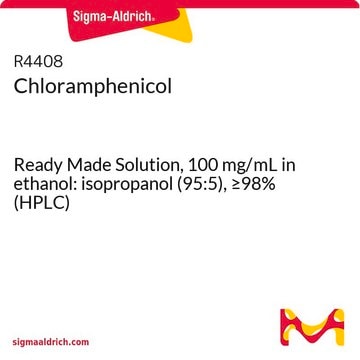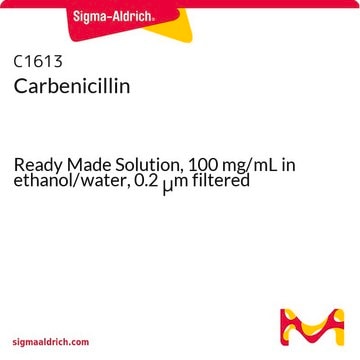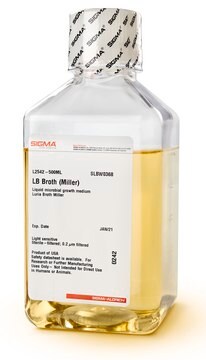A5354
Ampicillin
Ready Made Solution, 100 mg/mL, 0.2 μm filtered
Synonym(s):
Aminobenzylpenicillin
About This Item
Recommended Products
biological source
microbial
Quality Level
sterility
0.2 μm filtered
form
liquid
autoignition temp.
301 °C
storage condition
(Tightly closed. Keep locked up or in an area accessible only to qualified or authorized )
concentration
100 mg/mL
color
colorless to light yellow
solubility
DMSO: 100 mg/mL
suitability
suitable (for antibacterial use in culture media)
antibiotic activity spectrum
Gram-negative bacteria
Gram-positive bacteria
Mode of action
cell wall synthesis | interferes
shipped in
dry ice
storage temp.
−20°C
SMILES string
CC1(C(N2C(S1)C(C2=O)NC(=O)C(C3=CC=CC=C3)N)C(=O)[O-])C.[Na+]
InChI
1S/C16H19N3O4S.Na/c1-16(2)11(15(22)23)19-13(21)10(14(19)24-16)18-12(20)9(17)8-6-4-3-5-7-8;/h3-7,9-11,14H,17H2,1-2H3,(H,18,20)(H,22,23);/q;+1/p-1/t9-,10-,11+,14-;/m1./s1
InChI key
KLOHDWPABZXLGI-YWUHCJSESA-M
General description
Application
Biochem/physiol Actions
Antimicrobial Spectrum: Includes both gram-positive (similar to benzylpenicillin) and gram-negative bacteria (similar to tetracyclines and chloramphenicol.
Features and Benefits
- High-quality antibiotic suitable for multiple research applications
- Ideal for Cell Biology and Biochemical research.
Other Notes
related product
Signal Word
Danger
Hazard Statements
Precautionary Statements
Hazard Classifications
Resp. Sens. 1 - Skin Sens. 1
Storage Class Code
10 - Combustible liquids
WGK
WGK 2
Flash Point(F)
188.6 °F - closed cup
Flash Point(C)
87 °C - closed cup
Personal Protective Equipment
Regulatory Listings
Regulatory Listings are mainly provided for chemical products. Only limited information can be provided here for non-chemical products. No entry means none of the components are listed. It is the user’s obligation to ensure the safe and legal use of the product.
FSL
Group 4: Flammable liquids
Type 3 petroleums
Hazardous rank III
Water insoluble liquid
ISHL Indicated Name
Substances Subject to be Indicated Names
ISHL Notified Names
Substances Subject to be Notified Names
JAN Code
A5354-BULK:
A5354-10ML:
A5354-VAR:
A5354-1ML:
Choose from one of the most recent versions:
Certificates of Analysis (COA)
Don't see the Right Version?
If you require a particular version, you can look up a specific certificate by the Lot or Batch number.
Already Own This Product?
Find documentation for the products that you have recently purchased in the Document Library.
Customers Also Viewed
Our team of scientists has experience in all areas of research including Life Science, Material Science, Chemical Synthesis, Chromatography, Analytical and many others.
Contact Technical Service








